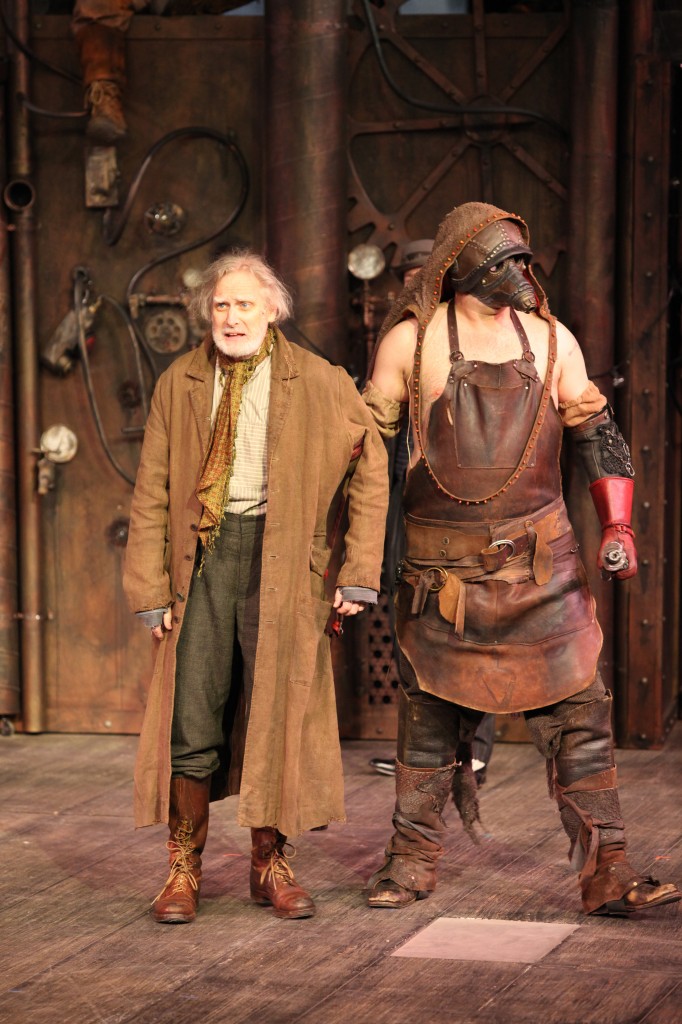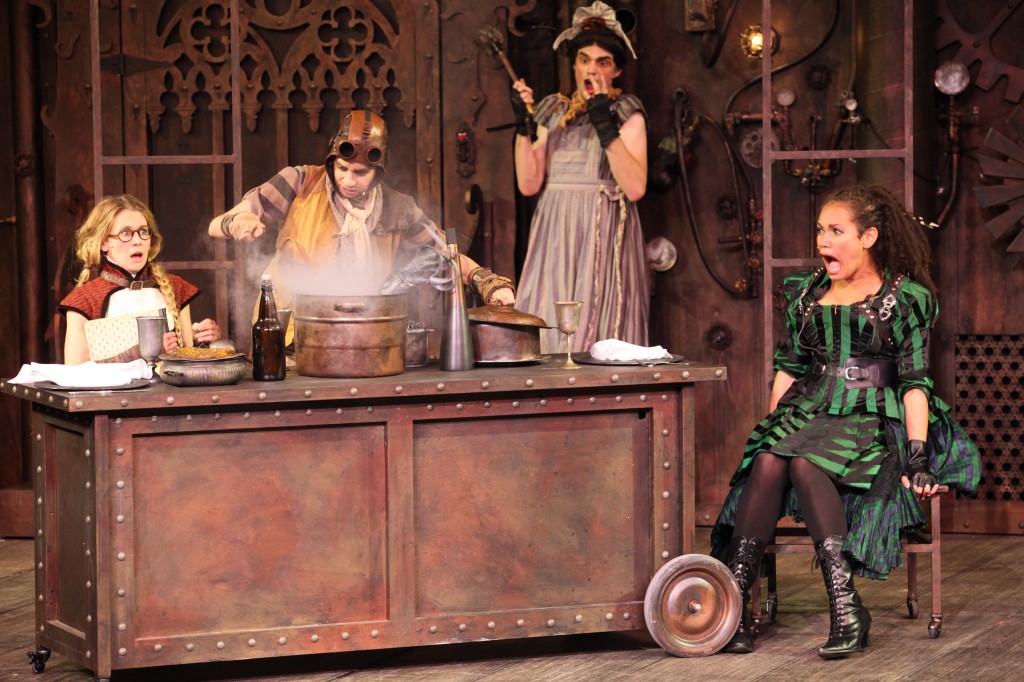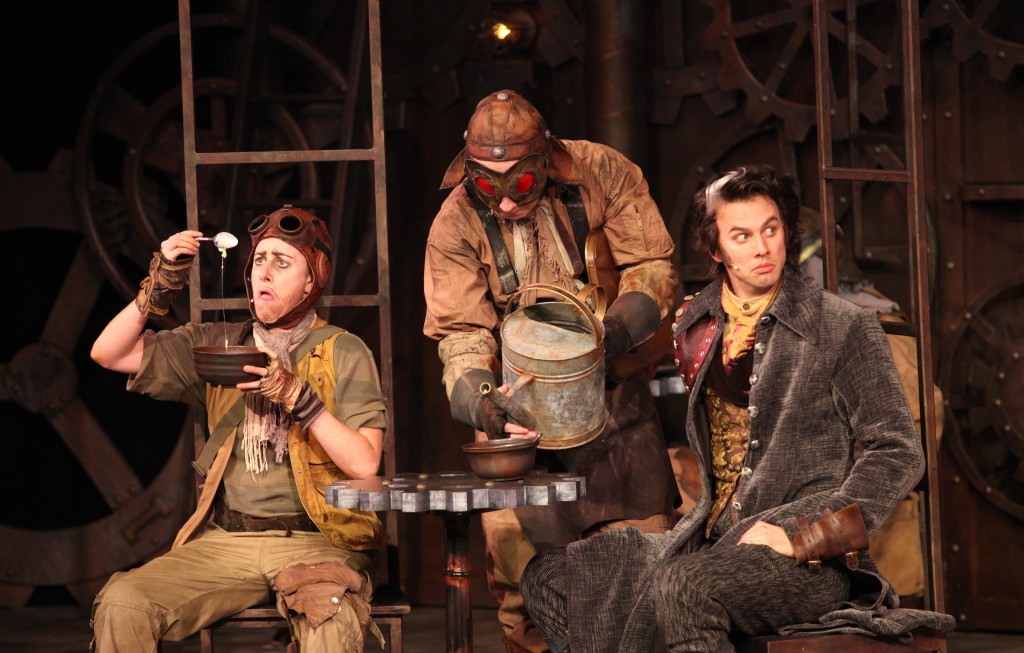
Credit: David Blue
At Bard on the Beach until September 26, 2015
604-739-0559/bardonthebeach.org
Posted June 14, 2015
Here’s a paradox for you: when Scott Bellis is on stage, everything gets calm and quiet. It’s as if he creates a contemplative aura around himself. We hang on his every word. Early in The Comedy of Errors, Bellis, as Egeon, the distraught father of twins Antipholus of Ephesus (Jay Hindle) and Antipholus of Syracuse (Ben Elliott), gives us the backstory and it’s the most lucid delivery I’ve heard: how, when travelling by sea with his wife, identical twin sons and identical twin servants, the ship was wrecked and the family was, like the ship itself, torn apart. Egeon has spent the last couple of decades looking for his wife and sons whom he continues to believe are alive.
The paradox is that Bellis, wearing the director’s hat, introduces so much business (busyness) into this production that the story, like that ship buffeted by winds, is all at sea.
But it’s fantastic looking. Pam Johnson creates a steampunk set with wheels and cogs, rivets and wrenches. At one point Dr. Pinch (Jeff Gladstone), a character described as “a cyborg and mad scientist” wheels a contraption of jangley bits on stage and performs what appears to be lobotomies on one of the Antipholusses and one of the Dromios. Lobotomies?

Credit: David Blue
Gerald King lights this set with flair and invention and, as always, Mara Gottler’s costumes are fabulous concoctions of plush and metallic, leather and lace, Victorian futuristic. Dr. Pinch, as a kind of master of ceremonies, wears a frock coat, mad hatter’s hat and goggles. There are a lot of goggles and shades in this production.
It begins fabulously with all the characters, choreographed by the incomparable Tara Cheyenne Friedenberg, coming onstage. It’s dark and shadowy and, under the power of Dr. Pinch, they move in lockstep just as if they, too, are part of the mechanical set.
Ben Elliott is outstanding as Antipholus of Syracuse. He’s long-limbed with a kind of elastic body and a hugely expressive face. Elliott’s long suit is a kind of goofy naiveté and it suits him well in this role in which, mistaken for his twin, he’s given jewellery, money and even Adriana, his brother’s wife (Sereana Malani) – which particular offer he appears especially to relish.
Dawn Petten is an alchemist: she turns every role into gold. She does it again here as Dromio of Ephesus, servant to Antipholus of Ephesus. Petten is the very definition of versatility: she can do tragedy as well as comedy. Here, she’s comic and without overworking the role, she’s a joy to watch. It’s the small, subtle stuff: a look, a gesture.
Always a crowd pleaser is Andrew McNee, here gender-blind cast as Nell, Adriana’s fat cook who has set her sights on Dromio of Syracuse (Luisa Jojic). Padded out in a cook’s apron and with lank grey hair and ‘floured’ face, McNee lumbers about, uttering deep growls. His finest moment might be when Nell wallops whatever live creature keeps trying to escape from the soup pot. Don’t remember that being in the script, either. But it got big laughs on opening night.

Credit: David Blue
Lili Beaudoin is a foxy courtesan (costumed in corsets and flounces); Lindsey Angell is a bookish-looking Luciana. And Sereana Malani makes a feisty, tough-broad Adriana.
This production, which had its genesis at Studio 58 in 2011 under Bellis’s direction, is fun – if frenzied – to watch. I raved about that earlier production. On the bigger stage, however, at some distance from the action and with so much business bordering on slapstick, the long-abiding love story between Egeon and his wife and their love for their children is eclipsed. And that’s a pity because even in Shakespeare’s silliest comedies, love conquers all.

